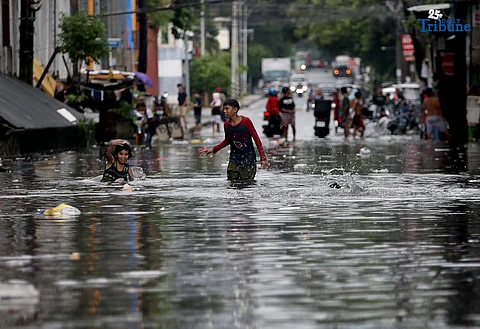
- NEWS
- the EDIT
- COMMENTARY
- BUSINESS
- LIFE
- SHOW
- ACTION
- GLOBAL GOALS
- SNAPS
- DYARYO TIRADA
- MORE

The Department of Health (DOH) reminded the public on Monday to refrain from swimming in flooded areas across the country as the risk of contracting leptospirosis remains high.
In a television program with People’s Television (PTV), DOH spokesperson Assistant Secretary Albert Domingo emphasized that the contents of dark and murky floodwaters remain unknown.
Domingo explained that these waters may contain leptospirosis bacteria, which come from a rodent’s urine.
“Leptospirosis, at first we think we don't feel anything, but even if we don't have a wound, the germ can enter our eyes, our mouth, our nose,” he said.
He added that leptospirosis has an incubation period of two to four weeks, or about one month.
Domingo urged the public to remain indoors during storms for their safety.
“Don't swim, don't do backflips, don't jump into floodwaters, let's just stay home,” he said.
With leptospirosis infections on the rise, the DOH also advised the public against relying on herbal remedies, warning that untreated cases may lead to serious complications.
“Sometimes herbal medications, their treatment may be symptomatic—maybe your body aches or your fever will disappear—but the antibiotic property, we are not sure about that. We are more sure about our first one, prophylaxis. Let's not wait for symptoms to appear. As long as we wade through a flood, whatever the reason, consult now because we have enough medicine in our health centers,” Domingo said.
The health official also cautioned the public about potential injuries, as dirty waters hide dangerous objects beneath the surface.
“There might be glass there, there might be wire there, there might be sharp metal that we can't see. If we step on it, our body might get injured,” Domingo noted.
In case of injury, Domingo said to wash the wound with clean water and soap as first aid, then wrap it with a clean cloth or bandage, depending on the wound’s size, to prevent further bleeding as the patient is brought to the nearest health center or hospital.
For evacuees staying in shelters, the DOH reminded them to wash their hands before handling any food to prevent contamination that could lead to stomach ache or diarrhea.
It also urged evacuees not to crowd together and to maintain physical distance as much as possible. If distancing is not feasible, the DOH encouraged them to wear a face mask to prevent exposure to viruses.
“If we are around a lot of people, let's not crowd together and keep our distance if possible. If not, wear a face mask so that we don't breathe in viruses or anything we have that could infect others,” he said.
According to the latest data from the National Disaster Risk Reduction and Management Council (NDRRMC), the combined effects of the Southwest Monsoon and Severe Tropical Storm Crising have affected more than 800,000 individuals, displacing over 90,000 people.
